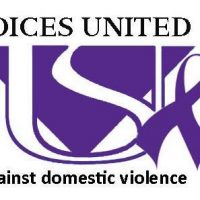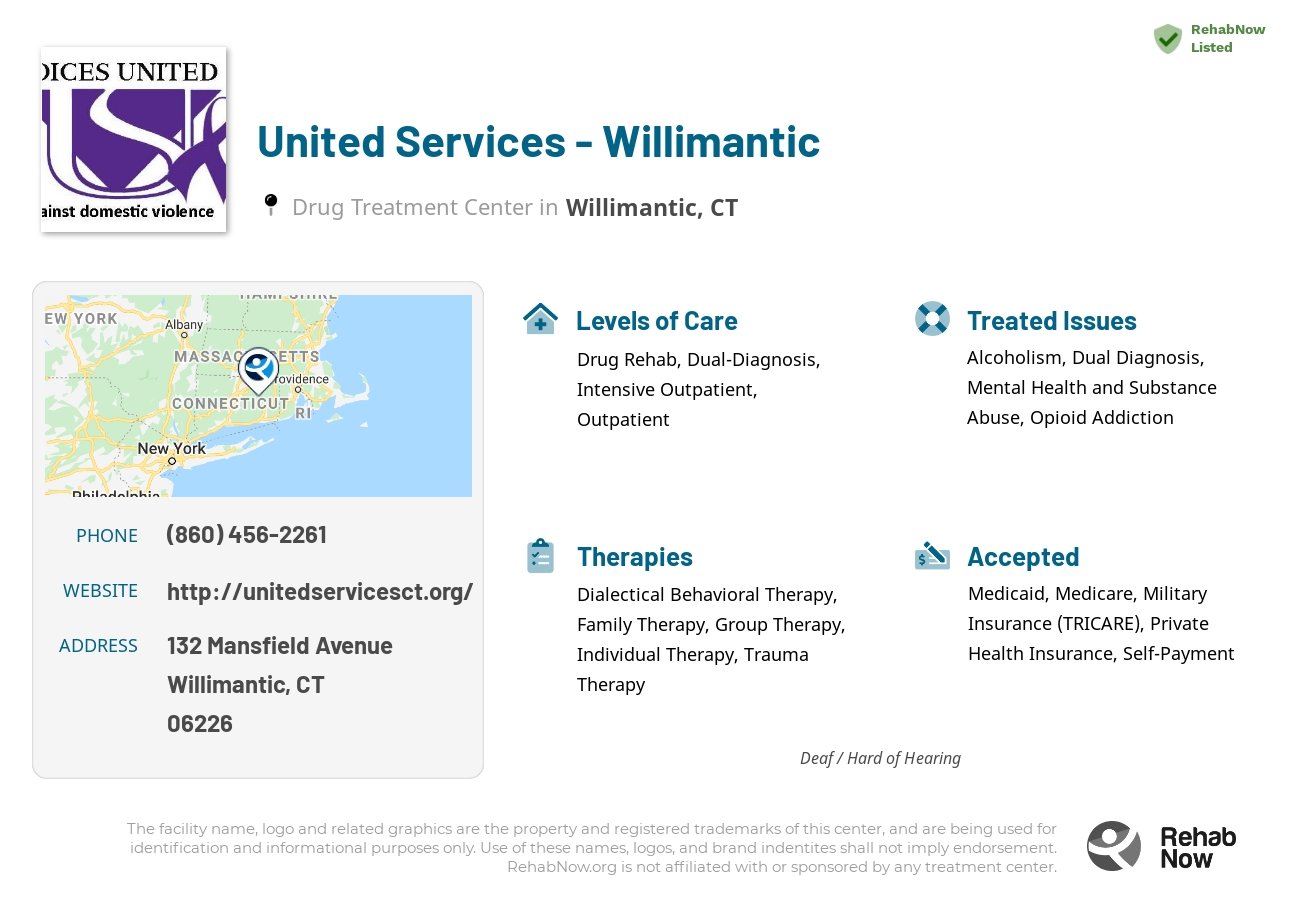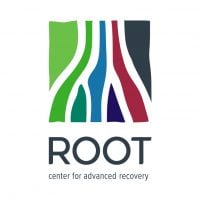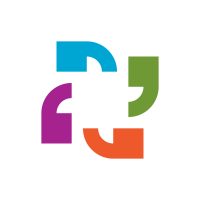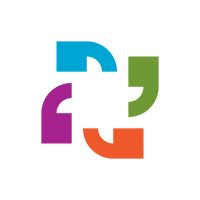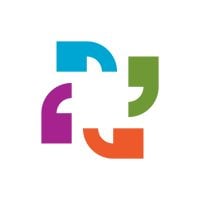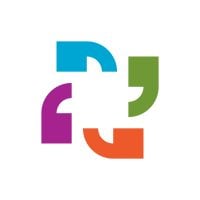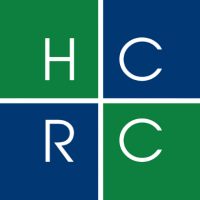United Services - Willimantic
Drug Rehab Center in Willimantic, Connecticut
United Services - Willimantic, Connecticut is a non-profit organization that offers a variety of evidence-based practices and individualized services to help individuals take control of their mental health and substance abuse condition, including medication-assisted therapies and residential treatment programs.
About United Services - Willimantic in Connecticut
United Services - Willimantic is a non-profit organization located in Willimantic, Connecticut that provides a range of human services and behavioral health care to individuals and families living in Eastern Connecticut. This mental health and substance abuse organization offers a variety of services to those suffering from addiction and substance abuse, from prevention programs to treatment options. They provide a range of evidence-based practices and individualized services to help individuals take control of their mental health and substance abuse condition.
At United Services - Willimantic, they believe that the path to recovery starts with understanding the sources of a person’s substance use. To that end, they offer a range of evidence-based interventions and treatment services, such as intensive outpatient and residential treatment programs, social work services, trauma-focused interventions, and family support services. Additionally, they offer medication-assisted therapies and individual and group therapy options to help clients develop personal coping strategies and strengthen their recovery networks.
United Services - Willimantic is accredited by The Joint Commission and is an approved provider of substance abuse services by the Connecticut Department of Mental Health & Addiction Services (DMHAS). They also have received numerous awards and recognitions, such as the 2018 Department of Mental Health & Addiction Services (DMHAS) Excellence in Performance Award and the 2017 Community Service Award. They are truly dedicated to providing the highest quality care and treatment to support individuals’ mental health and substance abuse recovery.
Genders
Ages
Modality
Additional
Conditions and Issues Treated
Opioid addiction has become a significant health problem in the United States. In 2015, there were 91 opioid overdose-related deaths per day, with a substantial increase in mortality rate in 2014.
When opioid addiction has reached a point where a person’s life becomes unmanageable, treatment options are available to help them get sober. Treatment that includes medical care with medications and counseling can help a user transition into sobriety.
When someone in struggles with both addiction and mental or emotional illness, this is considered a dual diagnosis. Dual diagnosis treatment can include therapy for these issues to happen simultaneously, which will allow either of them to be treated effectively.
Sometimes people who have suffered from addiction disorder also suffer from co-occurring disorders such as depression, anxiety, bipolar disorder, etc., making them “dual diagnoses.” Dual diagnoses require specialized treatment programs where drug and alcohol addiction are addressed along with psychiatric illnesses. Some rehabilitation facilities provide patients suffering from cooccurrences a program with highly integrated services and a clean environment with few distractions to help them succeed.
Levels of Care Offered
This center offers a variety of custom treatment tailored to individual recovery. Currently available are Drug Rehab, Dual-Diagnosis, Intensive Outpatient, Outpatient, with additional therapies available as listed below.
The Intensive Outpatient Program offered by United Services - Willimantic is designed for those who need intensive care but would rather get it in the comfort of their own home. The treatment programs vary in duration and intensity and can be tailored to suit the patient’s needs. The program includes regular visits to the facility, though the overnight stay is not needed. IOP is suitable for patients who have been treated in residential treatment programs and are in the transition phase. It helps the patient live at home and discharge some work or school responsibilities even while undergoing treatment. The patients gradually get back to their routine life with the support of a friend or family member.
Outpatient treatment is often used for drug addicts in drug rehab. Outpatient treatment consists of counseling and therapy sessions. This form of treatment is also called ‘day-treatment’. The outpatient treatment process begins with the addict’s initial detox period, lasting about ten days.
Outpatient treatment is used for those who are at moderate risk for ‘slipping back’ into the addiction, for those who:
- Are not currently experiencing any side effects from withdrawal and can handle social pressure
- Can handle stressors that might trigger relapse
- Have a stable living environment or have moved out of their previous environment, which was not conducive to being sober
- Have a support system that allows them to go to a facility a few times a week while still keeping their current responsibilities
- Have no legal obligations, being either on parole or probation, that require them to seek treatment at a mandatory facility
- Are not currently experiencing any side effects from withdrawal and can handle social pressure
- Have a stable living environment or have moved out of their previous environment, which was not conducive to being sober
Therapies & Programs
Because no single treatment is effective for all addicts, the goal of treatment and therapy should be to figure out what works best for each individual. Tolerance and withdrawal levels differ from person to person, affecting the treatment intensity required. Addiction treatment should aim to help addicts develop healthy coping mechanisms for dealing with their addiction and its underlying causes.
Family therapy is beneficial for people who are in addiction treatment services because it offers addicts the opportunity to work with their family members to better understand what led them to make choices that contributed to their addiction.
This type of therapy helps family members reach a deeper understanding of how they can best support their loved one during recovery. It also helps the addict better understand their own motivations and triggers that led them to turn to substance abuse.
Family therapy can help addicts in the following ways:
- Assists family members in processing difficult feelings so they don’t blame or resent recovering addicts
- Assists family members in understanding how addiction has impacted the addict and everyone who is involved with them
- Allows the addict to take responsibility for their actions, while encouraging improved communication skills
- Helps family members understand how to best support an individual in recovery so addicts don’t relapse again.
Group therapy can help build a stronger support system and give addicts in Willimantic, CT insight into their addiction that they gain through shared conversations. Group therapy occurs in a controlled group environment, exclusive of one on one meetings. This makes it safer for patients to feel comfortable sharing the struggles they’re going through and gaining perspective.
Trauma therapy is beneficial for people who are recovering from drug addiction because it helps them heal from past traumas that may have caused them to turn to harmful substances or led them to experience negative emotions that contributed to their destructive behaviors.
This type of treatment works by processing difficult experiences so individuals can learn how to process these events without having to turn to substances for coping.
Trauma therapy can help addicts in the following ways:
- Helps individuals understand their experiences and emotional responses to difficult events, including why they turned to drugs or alcohol
- Provides them with comfort and support while working through difficult emotions related to these traumatic experiences
- Offers an opportunity for addicts to have a voice and be heard, which can improve their self-esteem
- Can help them develop coping skills so they can better respond to triggers instead of turning to substance abuse.
Dialectical Behavior Therapy (DBT) is a cognitive-behavioral therapy that helps patients understand the relationship between their thoughts, feelings, and behaviors. It is beneficial for those whose addictions and behaviors stem from severe mental health issues. The term “Dialectic” means the integration of opposites. In substance abuse, DBT refers to accepting the patient’s addiction and working to change their thoughts and behavior. It improves life skills such as controlling intense emotions without reacting impulsively, resolving interpersonal conflicts effectively, and promoting awareness about self and others.
Cognitive-behavioral therapy is a technique that is used to help people with addiction. Specifically, it is a way of identifying thoughts and behaviors that cause the addiction. It is typically used in an individual counseling session.
The content explains cognitive behavioral therapy and how it works to address some behaviors that may be leading to unintended consequences in their life, as well as its benefits for those seeking sobriety.
It works by helping people to talk through their issues and addressing the thoughts that cause said behaviors. It is an excellent way of learning about oneself and one’s perception of the world.
Payment Options Accepted
For specific insurance or payment methods please contact us.
Is your insurance accepted?
Ask an expert, call (888) 674-0062
United Services Associated Centers
Discover treatment facilities under the same provider.
- United Services - Mansfield in Willimantic, CT
- United Services - Dayville in Dayville, CT
- United Services - Dayville in Dayville, CT
Learn More About United Services Centers
Additional Details
Specifics, location, and helpful extra information.
Willimantic, Connecticut 6226 Phone Number(860) 456-2261 Meta DetailsUpdated November 25, 2023
Staff Verified
United Services - Willimantic Patient Reviews
There are no reviews yet. Be the first one to write one.
Willimantic, Connecticut Addiction Information
Connecticut has a higher rate of substance abuse and addiction than the national average. The state ranks in the top 10 in the country for illicit drug dependence among those ages 18 to 25. In 2010, there were 9,211 people admitted to an alcohol treatment facility for alcohol abuse combined with a secondary drug. Connecticut ranked fifth in the United States of America for the number of fatalities involving drunk driving in 2014.
The drug addiction problem in Willimantic, Connecticut, is relatively severe. Out of 18,000 people, over 6,000 people in the Willimantic are addicted to drugs. The rates of addiction and abuse are high, and the problem is only getting worse. Drug addiction treatment in Willimantic, Connecticut, can vary depending on the facility, but typically, it will involve counseling, therapy, and medication.
Treatment in Nearby Cities
- Kent, CT (64.7 mi.)
- Old Lyme, CT (28.3 mi.)
- Hamden, CT (42.0 mi.)
- Sharon, CT (65.5 mi.)
- Wilton, CT (72.5 mi.)
Centers near United Services - Willimantic
The facility name, logo and brand are the property and registered trademarks of United Services - Willimantic, and are being used for identification and informational purposes only. Use of these names, logos and brands shall not imply endorsement. RehabNow.org is not affiliated with or sponsored by United Services - Willimantic.
